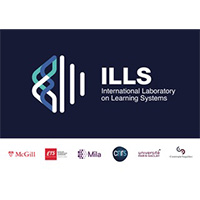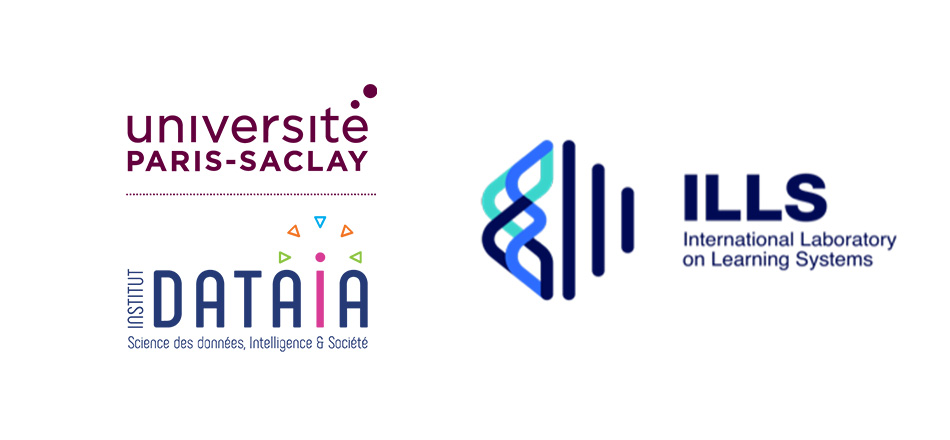Le workshop ILLS et DATAIA
Le workshop ILLS et DATAIA se déroulera sur 3 jours et vise à réunir des experts de diverses institutions académiques et de recherche françaises et canadiennes pour partager leurs connaissances et leurs idées sur les dernières tendances et avancées dans le domaine de l'IA. Il sera un lieu de rencontre pour les membres de la communauté DATAIA et ceux de ILLS qui présenteront leurs travaux de recherche, discuteront de leurs résultats et collaboreront avec leurs pairs pour identifier de nouvelles orientations et opportunités de recherche.
Un large éventail de sujets liés à l'IA sera proposé, notamment le traitement du langage naturel, la vision par ordinateur, l'apprentissage automatique et l'apprentissage en profondeur. Les participants partageront leurs expériences et leurs idées sur les défis et les opportunités dans ces domaines et discuteront de la manière dont ils peuvent être relevés grâce à la collaboration et à la recherche interdisciplinaire. En plus des présentations de recherche et des discussions, le workshop comprendra des séances de brainstorming avec des experts renommés dans le domaine qui partageront leurs points de vue sur l'avenir de l'IA et le rôle de la collaboration entre la France et le Canada pour faire avancer le domaine.
Le workshop offre une occasion unique aux participants de s'engager dans des discussions significatives, de favoriser une communauté de chercheurs pour établir de nouvelles collaborations et d'explorer de nouveaux axes de recherche en IA.
Inscriptions gratuites mais obligatoires dans la limite des places disponibles. Des cafés d'accueil sont offerts aux participants le matin et l'après-midi (déjeuner non inclus).
Le laboratoire ILLS

Le laboratoire ILLS (International Laboratory on Learning Systems) associe le CNRS, l’Université McGill, l’École de Technologie Supérieure (ETS) de Montréal, l’Institut Québécois d’Intelligence Artificielle (Mila), l’Université Paris-Saclay et CentraleSupélec.
Les travaux qui y sont menés concernent le développement d’outils mathématiques pour améliorer les algorithmes de machine learning et en sécuriser l’utilisation. Ces algorithmes pourront être utilisés pour le traitement du langage naturel et de la parole (TAL), pour des applications autour de la vision par ordinateur et du traitement des signaux.
Mercredi 24 mai
Lieu : Amphi sc.046 (Peugeot), Bâtiment Bouygues, CentraleSupélec
- 8h30 - 9h : accueil
9h - 10h30 : 1ère session "AI for Personalized Medicine"
Mots-clés : Computer Vision, Medical Image Analysis, Deep Learning
-
9h : Tal Arbel (Mila - ILLS, McGill)
The Promise of AI for Image-Based Personalized Medicine -
9h45 : Maria Vakalopoulou (MICS, CentraleSupélec, DATAIA)
Deep Learning in Medical Imaging and Digital Pathology -
10h05 : Nikos Paragios (TheraPanacea)
What if we could meaningfully improve cancer care by making precision medicine a reality? - 10h30 - 11h : pause
11h - 12h30 : 2ème session "Robust Learning and Unlabeled Data"
Mots-clés : Computer Vision, Machine Learning, Image Analysis
-
11h : Christian Desrosiers (Livia - ILLS, ETS)
Image Analysis with Unlabeled Data: Doing More with Less -
11h45 : Nicolas Thome (UPMC, Sorbonne Université)
Robust and Hybrid Machine Learning - 12h10 : Florent Bouchard (L2S, CNRS)
Leveraging robust statistics for EEG classification - 12h30 - 14h30 : pause repas
14h30 - 15h35 : 3ème session "Societal Impacts of AI Solutions"
Mots-clés : Roboethics, AI Ethics
-
14h30 : AJung Moon (Mila - ILLS, McGill)
Responsible Design of Interactive Systems -
15h15 : Claire Monteleoni (LISN, Inria)
Machine Learning Research for Climate Change and Environmental Sustainability - 15h35 : Sonia Ben-Mokhtar (LIRIS, CNRS)
Decentralized Learning (as an enabler) for Decentralized Online Services
Jeudi 25 mai
Lieu : Amphi II, Bâtiment Eiffel, CentraleSupélec
- 8h30 - 9h : accueil
9h - 10h30 : 1ère session "Intelligent Systems and Conversational Agents"
Mots-clés : Human-Computer Interaction, Robots
- 9h : Jeremy R. Cooperstock (CIM - ILLS, McGill)
Intelligent Systems to Enhance Human Experience - 9h45 : Xavier Alameda-Pineda (RobotLearn Team, Inria)
Learning for Robots in Conversational Groups - 10h15 - 10h45 : pause
10h50 - 12h30 : 2ème session "Language Models, Generation and Understanding"
Mots-clés : Natural Language Models, Applications
-
10h50 : François Yvon (Sorbonne Université, CNRS)
Wonders and Mysteries of Multilingual Language Models -
11h10 : Nona Naderi (LISN, Université Paris-Saclay)
Natural Language Processing for Public Health and Clinical Science -
11h30 : Frédéric Bechet (LIS, Aix Marseille Université)
Natural Language Understanding: from Classification to Generation and Back? -
12h : Maks Ovsjanikov (Lix, IPP)
Efficient and Robust Learning on Non-Rigid Surfaces and Graphs -
12h30 - 13h30 : pause repas
13h30 - 15h : 3ème session "Few-Shot and Learning and Weakly-Supervised Learning"
Mots-clés : Machine Learning, Computer Vision
- 13h30 : Eric Granger (Livia - ILLS, ETS)
Adaptation of Deep Neural Networks for Video Recognition with Weakly-Labeled Data - 14h10 : Jose Dolz (Livia - ILLS, ETS)
Learning with Limited Supervision
- 15h45 - 17h : Séminaire DATAIA - Jonathan Niles-Weed
Vendredi 26 mai
Lieu : Amphi sc.046 (Peugeot), Bâtiment Bouygues, CentraleSupélec
- 8h30 - 9h : accueil
9h - 10h30 : 1ère session "Optimization in Machine Learning"
Mots-clés : Optimization in ML, Learning Theory
-
9h : Marco Pedersoli (Livia - ILLS, ETS)
Learning is bilevel optimization -
9h45 : Emilie Chouzenoux (CVN, Inria, DATAIA)
PrimAl Dual Minimum Description LEngth (PADDLE) for Practical Few-Shot Learning -
10h05 : Gabriele Facciolo (Centre Borelli, ENS Paris Saclay)
Self-supervised Image Restoration -
10h30 - 11h : pause
11h - 12h30 : 2ème session "Learning on Graphs and Decentralized Learning"
Mots-clés : Computer Networks, Federated Learning
-
11h : Mark Coates (CIM - ILLS, McGill)
Learning from Data on Graphs -
11h45 : Laurent Oudre (Centre Borelli, ENS Saclay, DATAIA)
Graph Signal Processing for the Study of Multivariate Physiological Signals
En collaboration avec le Séminaire S³ (porté par le L2S) -
12h30 - 14h : pause repas
14h - 15h30 : 3ème session "AI Solutions for Video Challenges and Environmental Impacts"
Mots-clés : Signal Processing, Deep Learning, Compression, Video Processing
-
14h : Stéphane Coulombe (ILLS, ETS)
Immersive Video Challenges and Some AI Solutions -
14h45 : Anne-Laure Ligozat (LISN, Université Paris-Saclay)
Environmental Impacts of AI -
15h05 : Giuseppe Valenzise (L2S, CNRS)
AI-Based Compression for Immersive Video: Current Trends and Future Directions - 15h30 - 16h : pause
16h - 16h50 : 4ème session "Online Learning"
Mots-clés : Reinforcement Learning, Bandits, Learning Theory
- 16h : Hédi Hadiji (L2S, CentraleSupélec)
Adapting to Unknown Parameters in Online Learning and Bandits -
16h25 : Silviu Maniu (LISN, Université Paris-Saclay)
Multi-armed Bandits for Influence Propagation
Pour assister au séminaire à distance (via Teams) :
https://www.microsoft.com/fr-fr/microsoft-teams/join-a-meeting?rtc=1
ID de la réunion : 326 746 607 654
Code secret : P8KPH4
Dates : du mercredi 24 au vendredi 26 mai 2023.
Lieux (CentraleSupélec, Gif-sur-Yvette) :
- Mercredi 24 mai - Amphi sc.046 (Peugeot), Bâtiment Bouygues
- Jeudi 25 mai - Amphi II, Bâtiment Eiffel
- Vendredi 26 mai - Amphi sc.046 (Peugeot), Bâtiment Bouygues
Accès pour rejoindre le lieu du workshop depuis Paris : RER B - arrêt "Le Guichet" puis prendre le bus 9 direction Campus HEC, Jouy-en-Josas et descendre à l'arrêt "Moulon".






